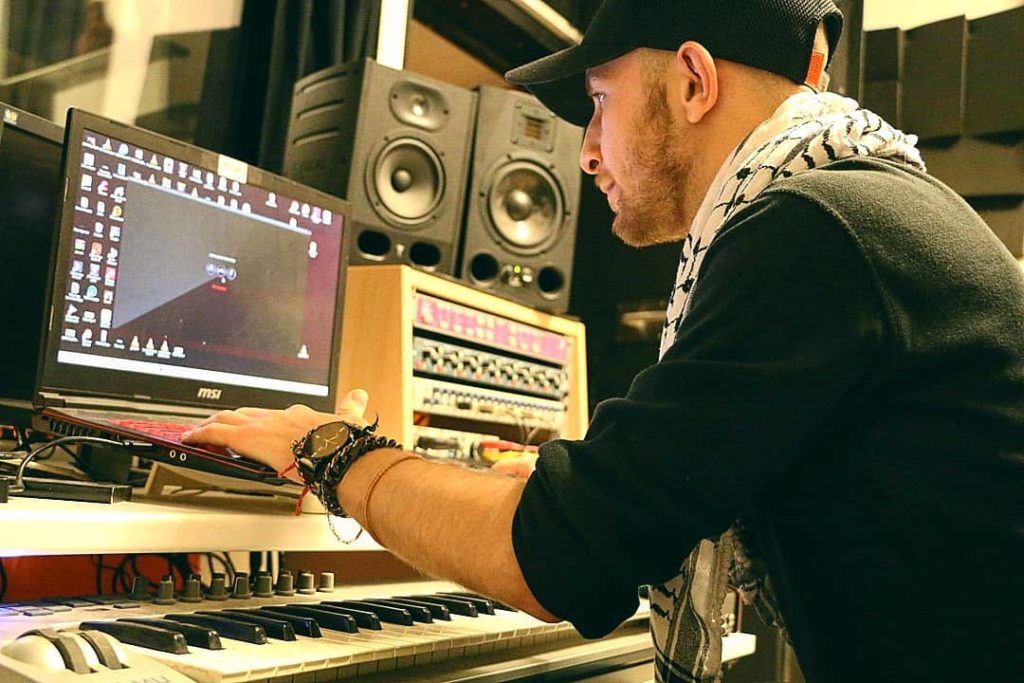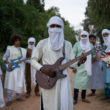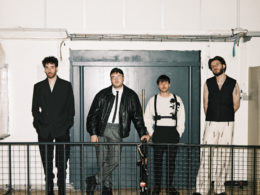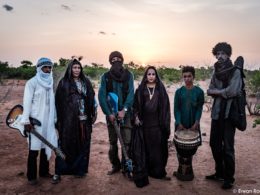WHAT A TUNE meets viral artist and producer Eljoee to talk North African music, upcoming projects, and the surprising story behind how his biggest hit to date came about.
With no record label backing or publisher, just an ear for a good melody and a dedicated work ethic, Marseille’s hottest new producer Eljoee has artists and labels queuing up to collaborate, and he has yet to even release an EP.
“I was just checking my Instagram and it reminded me I posted a story on this day back in 2020 and I remember I was happy because I reached 10k views on my YouTube video. And now? I’m getting millions… I could never have predicted this.” He exclaims shaking his head over a video call.
The 28-year-old Algerian producer is at the forefront of a new wave of North African talent reworking their local heritage music to include deep house and electro influences.
For Eljoee, his organic success is not only down to capturing the essence of ethnic Maghrebi sounds, but also due to his unique talent of ‘remaking’ old chaabi and rai songs, usually with the help of a guest singer.
“It’s about trying to make new generations listen to old music but in a different way, I don’t think that teenagers now listen to old music, we’re going to lose all this heritage… I want to protect it and reproduce it, so the next generation will listen to it… dance to it… be inspired by it, that’s my dream.”
Eljoee was born Billel Mehsen and grew up in the city of Blida, Algeria. He’s always been musical; he played guitar in an Andalusi music band as a teenager and his teacher nicknamed him ‘Joe’ after Joe Satriani (which also partly inspired his artist name).
Although Eljoee now revives old Magrebhi music, he grew up listening to the likes of ABBA and the Bee Gees. “My father was a sailor, so he brought us [myself and my siblings] all the new music from USA; Jazz, Pop, The Blues…”.
After finishing his education, he composed music for advertising and did production work, teaching himself everything from scratch; “YouTube is my teacher, my university, my everything,” he tells me. He left Algeria when he was 24 and now lives in Marseille.
In 2020, the world went into lockdown, and the producer found himself with a lot more time on his hands. He began releasing tracks under a new artist name: Eljoee (meaning ‘atmosphere’ in Arabic). At first, a few original tracks and some remixes (Cheb Khaled, Cheb Mami). Then one day, whilst scrolling through YouTube, he discovered the Moroccan singer CHAAMA.
“I was amazed by her voice; I was like damn, this girl could be something really good.”
Eljoee found a video of her singing a cover of an old Moroccan folk song, Haka Mama, about a star-crossed love between a Moroccan Jew and a Muslim.
“I took the vocals from the video, created this song using her voice, sent it to her and was like: ‘Are you down for a collaboration?’ And she was like: ‘Dude this is great!’.”
They finished the song in three days and called it Lala Mama.
The song was a hit, clocking up millions of streams and views. It’s easy to see why, CHAAMA’s quivering silken voice flows into a hypnotic clarinet and duduk led hook, while the Arabic qanun intertwines with rolling deep house bass. Impressively, Eljoee plays all the instruments on the record.
“When I listen to the song, it gives my chills, I don’t get chills when I listen to my songs but this yes, it has something.”
Although they’ve never met (CHAAMA lives in Germany), they make a perfect team. Eljoee handles production, while CHAAMA provides vocals, and as a graphic designer, CHAAMA also takes care of the artwork.
“As CHAAMA says, I am her husband in music.” He laughs. “We complete each other.”
Eljoee is always hunting for his next remake and listens to a lot of ethnic music, “Algerian, Turkish, Indian…” and is adamant about not wanting to listen to too much contemporary music so as not to sound like other producers, “I don’t want to copy anything.”
Apart from a few exceptions.
When I push him to tell me what he’s listened to recently, he looks over at his Spotify open on his second screen and smiles sheepishly.
“There’s one band I really love…you know…” he pauses, “…Coldplay?”
I confide that I’m also a fan, and he breaks into a wide grin. “Good, if you didn’t love Coldplay then I would leave right now.”
“They’re the only band that been there for three generations for me; Viva La Vida, Trouble, and now with Selena Gomez and BTS, but they still have their own identity. I don’t know them, but they seem like nice people, real artists, not just interested in money who go around on jets and don’t care about the world.”

At the start of this year, he released Hiya Hiya with CHAAMA, his most successful track to date.
Far from trawling through old records to find the perfect remake, Eljoee discovered the song completely by chance. While in his local Algerian restaurant in Marseille, he overheard the original version by Haja El Hamdaouia over the speakers and was instantly hooked.
He sent a demo of the new idea to CHAAMA, reimagining Hiya Hiya with a more laid-back tempo and deep house groove. They finalised the recording and released it, without expecting much. The first few weeks post-release were normal, a few clicks and streams but nothing more than what they’d expected. Then it took off.
“The second or third month, [Hiya Hiya] was everywhere and people started calling me from Algeria… then in May or June, that was when it went really viral, a lot of influencers used it in reels and on TikTok.”
Hiya Hiya became the song of the summer in the Arabic speaking world, playing everywhere you went. It currently has nearly 100 million YouTube views on Eljoee and CHAAMA’s channels combined and spent over 30 weeks on the Spotify charts.
“My life has changed since we released LaLa Mama and it changed again when we released Hiya Hiya… One song can change your life.” He muses.
However, it hasn’t been an easy ride. With little knowledge of the industry, Eljoee and CHAAMA soon had copyright claims to contend with and a lot of people trying to jump on the bandwagon.
“People were trying to screw us over, trying to sign with us so they could take royalties, trying to scare us, threatening us, threatening our channels, we had messages from YouTube partners.”
Without proper copyright protection in place, some people even re-released Hiya Hiya under their own channel or artist profiles to collect streaming royalties. But it was a lesson learned at least, he admits, always get everything cleared before releasing.
Today, everyone wants the Eljoee magic production touch on their songs.
“How many emails do you get every day?” I ask.
“Tons.” He exhales.
But, he adds, it’s a rite of passage for any aspiring artist, “I was one of those people once, sending my demos everywhere, and digging to sign with labels.”
Now, the labels come to him, and he currently does freelance production for Universal Music MENA, alongside his independent projects. The first fruit of his work with Universal is the stunning Anta featuring Lebanese singer-songwriter Rima Yussef released in August this year.
As his DIY project reaches new heights, Eljoee is feeling the pressure and is keenly aware that his runaway success could evaporate as quickly as it arrived.
“It’s good and it’s exciting but I work a lot and I don’t find time for myself and sometimes I wake up at 3am and I realise I didn’t eat or do anything all day except produce and play music. It’s hard because I’m at my highest point where I can fall at any time, and I don’t want to fall. It’s now or never.”
True to his word, Eljoee shows no signs of slowing down. He has a few projects coming out for Universal MENA, a Cheb Hasni remake dropping in October and most excitingly, an upcoming EP with CHAAMA, details of which are still under wraps.
I ask if he has some advice for any budding producers. He nods, “Just stay focused on your production, don’t search for labels, if your music is good, it will be heard sooner or later.”








